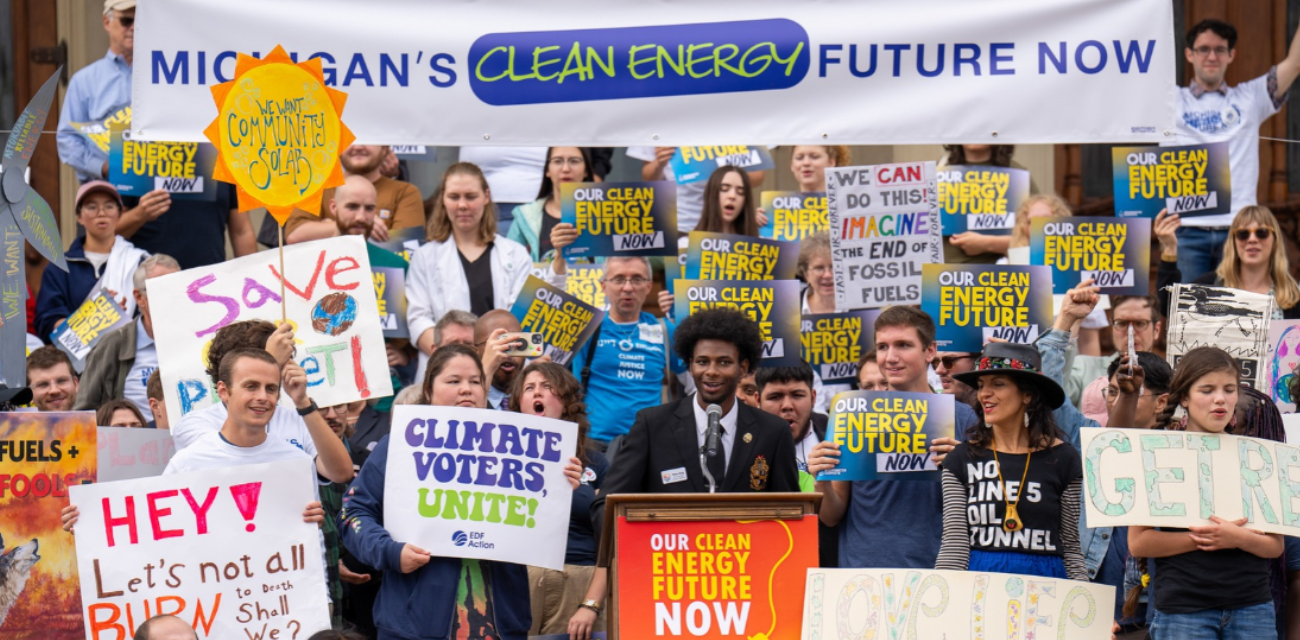Politics: tough. People: tougher. Uniting for climate action

Authored by
Colleen Otte is no grizzled, veteran climate activist, but even in her few years in the movement, she’s seen how far Michigan has come.
Otte is the communications manager for the Michigan Climate Action Network (MiCAN). When MiCAN formed in 2015, she said climate change was something not often talked about. That made solutions like carbon neutrality unattainable.
Yet, just eight years later, Gov. Gretchen Whitmer signed one of the nation’s boldest sets of climate policies into law.
By 2040, Michigan will have 100% clean energy, major energy efficiency upgrades, and better long-term planning by utility companies, made possible by thousands of workers in new jobs.
All of this happened despite well-funded, well-connected special interest groups who tried to water down a truly ambitious and just clean energy transition.
“We kind of say that our movement is not yet at fighting weight, because we know that this is not a fair fight to begin with, really,” said Otte.
What made this historic climate moment happen, then, despite the odds? Michigan had the public support, the research, experts, and activists. It was just a matter of coming together.

This sort of movement building is a key pillar of the Michigan Environmental Council’s mission to protect our state’s air, water, and beloved places.
Through the Energy Foundation, we gave $142,600 in grants to four of our member organizations for movement building work: MiCAN, Clean Water Action – Michigan, Detroiters Working for Environmental Justice, and Michigan Clinicians for Climate Action. It was meant to give an extra boost at a critical moment in history so we, together, could better match the funding and collective power of the goliath opposition.
In MiCAN’s case, power came from being a connector and communicator. The nonprofit brings climate groups together and it amplifies climate facts, stories, and opportunities across the state.
The grant funding built on these strengths. MiCAN used its money to drive attendance at climate rallies, events, and legislator meetings. It also launched a digital campaign to get people to email their lawmakers in support of those landmark climate policies.
While a single phone call or rally sign can feel small, a large group can make a difference.
“Every signature and every person at a rally counts,” Otte said.
Whereas Otte and MiCAN drove mass turnout to climate action, Elizabeth Del Buono, MD and Michigan Clinicians for Climate Action (or MiCCA) used their grant funding for a targeted approach: help healthcare professionals and patients “connect the dots” between their health and environment.
“What we’re trying to do is… really shine a light on what we describe as the human face of the climate crisis and emphasize that taking action on climate change is not only good for the environment but that it improves human health,” said Del Buono, a former pathologist.
Sweltering days can cause heat stroke and dehydration. Storm-induced power outages can shut down oxygen machines and dialysis treatment and electric wheelchairs. Ozone action days and belching smoke stacks can exacerbate heart and lung conditions.
MiCCA’s goal is to help patients and professionals realize that the environment we live in can create or exacerbate health conditions. Once that becomes clear, so does a preventative prescription to it: a clean energy future.
Over months of advocacy, healthcare professionals met with lawmakers to share their stories. People afflicted with medical conditions shared how climate change (and the polluters behind it) hurt them even more. They garnered media attention and even moved more conservative minds.
“Everybody wants to protect their health,” Del Buono said. “Everybody wants to protect the health of people they love. Framing things in terms of health seems to be a way that allows us to open a conversation.”
It must have worked. Months of intense advocacy by MiCCA, MiCAN, and many others resulted in one of the most bold sets of climate laws in the country.
“It will mean something to the world that a purple manufacturing state like Michigan can accomplish this kind of progress,” Otte said.
The fight isn’t over, though. Otte and MiCAN will continue to fight for improvements to the climate laws, and Del Buono and MiCCA will continue to change the healthcare system from within. But if Del Buono’s talks with young nurses and clinicians mean anything, the movement building ahead is in capable hands.
“The next generation has a mindset that’s just much more collaborative and less competitive,” she said. “It’s more community-driven and less egocentric. I feel like that gives me so much more hope for the future.”
Discover
Power environmental change today.
Your gift to the Michigan Environmental Council is a powerful investment in the air we breathe, our water and the places we love.
Sign up for environmental news & stories.
"*" indicates required fields




